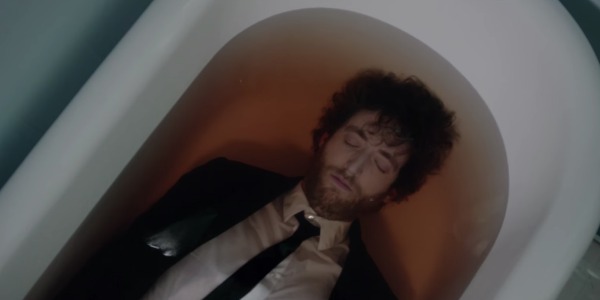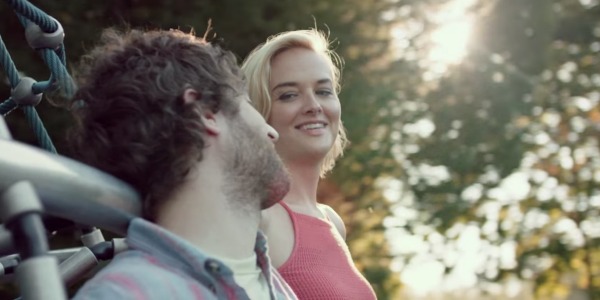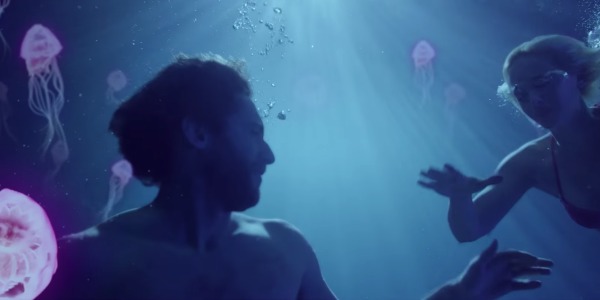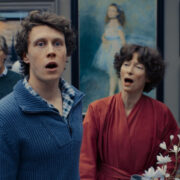ENTANGLEMENT: A Wholly Original, Expectation-Subverting Gem

Alex Arabian is a freelance film journalist and filmmaker. His…
Of all the subjects to center a film around, suicide is one of the more delicate and difficult to tackle for obvious reasons. Entanglement not only focuses on its main character’s (Thomas Middleditch) suicide attempt, but also his intricate mental illnesses surrounding it for the entirety of the film, and it does so in such a sensitive and uniquely cinematic way that it is impossible not to applaud its writer, Jason Filiatrault, and director, Jason James. This is not the story you think it is.
Entanglement tells the tale of Ben (Middleditch), who, after a failed suicide attempt, neurotically embarks on a mission to find out where his life went wrong by digging up his past. In the process, he finds out from his parents that he had an adoptive sister for one day before his mother found out that she was pregnant and had to legally give the baby back to adoptive services.
The thought of almost having a sister opens up possibilities of what could have been for Ben and what could still be, a support system. Hope. A future that isn’t bleak and hapless. With a story full of surprising twists and turns, a canvas of dazzling onscreen visuals, and a career-best performance from Middleditch, Entanglement succeeds on several tiers.
The Fine Line Of Adding Levity To Morbidity
It isn’t an easy thing to do. Most storytellers fail miserably, pun intended, at it. Ben tries several ways to end his life including carbon monoxide poisoning, hanging, pill overdose, electrocution, and wrist-cutting. While this is meant to be comedic, it can seem, at times, to be a bit tasteless.
However, Middleditch’s honest performance finds the humor in the situation that isn’t quite written with as much grace as it should be on paper. Filiatrault and James don’t overdo it with the comedy in other aspects, as they shouldn’t. In fact, Entanglement provides a sympathetic portrayal of depression in the aftermath of the suicide attempt.

For Ben, personally, stale and dry humor keeps him from thinking about his depression. When he isn’t talking, he stares blankly into the void, and its quite haunting, especially when paired with Andrew Harris’ hypnotic score. This isn’t the nervous, fast-talking Middleditch viewers are used to seeing, but rather, this is a much more subdued Middleditch.
Ben suffers from various mental illnesses that aren’t explicitly mentioned in the film. He hears voices and sees hallucinations; the audience doesn’t know if its the medication that his psychiatrist has him on or if its a result of his mental breakdown after his separation from his ex-wife, who cheated on him.
Middleditch & Weixler Mesh Together Consummately
It is through Middleditch’s Ben and his long lost almost-sister, Hanna’s (Jess Weixler) chemistry that Entanglement brings the most out of its themes. Their characters are tied together by what Hanna refers to as quantum entanglement, a physical phenomenon wherein a pair of particles are conceived or interact in ways such that the quantum state (a description for a physical system that solely exists independently of observation) of each particle cannot be described independently of the others.
So, Ben and Hanna become two peas in a pod, so to speak. Weixler’s open, free-spirited, confident bad-girl persona offsets Middleditch’s disoriented, soft-spoken, introverted grody portrayal. Together, among other things, they bond over the theme of the damage that parents inflict upon children, either knowingly or unknowingly.

There is an important recurring written and spoken motif of “just let go” that one doesn’t quite understand until the end of Entanglement. Life is compared to a pattern, where, if we are stuck inside of it, we can’t see it, and so we feel the need to find a way to get out of it; a woven tapestry with occasional empty threads hanging off of it.
Filiatrault emphasizes the theme here, hammers it down, rather, that everything in life is connected, but not everyone has the luxury of admiring it or seeing the beauty in it. For the sake of a spoiler-free comparison, “just let go” has multiple meanings. For most of Entanglement, it signifies the importance of letting go of one’s past.
The oldies rock and roll, doo-wop, and motown soundtrack emphasize Ben’s headspace, his fixation with the past, wonderfully. There are several set pieces and subtle objects strategically placed within Entanglement that transport the viewer to a different era. The old-fashioned diner at which Ben and Hanna eat, the old black-and-white polaroid flash camera that the street artist takes of Ben and Hanna, the 1940s-era, Disney-like animation that Ben and Hanna visualize.
Gravity Of The Imagery & Secondary Performances
Speaking of visuals, as part of Ben’s hallucinations, including the Disney-esque animation, James sprinkles Entanglement with awe-inspiring, imaginative sequences that match Ben’s dreamlike fixation with Hanna. There are alluring arrangements including jellyfish and fireworks.
And, as part of Ben’s mental illness, the talking stuffed animal and the alternate persona when he glances in the mirror give tiny hints about where the story may lead. These add-ons to an otherwise straightforwardly-directed film provide emotional gravitas to Ben’s mental struggles and key plot elements to Filiatrault’s story.

Ben has a support group outside of Hanna, who, by many means, is a bad influence on him. His therapist, Dr. Jill Franklyn (Johannah Newmarch), his parents, however dysfunctional they may be, and his loyal neighbor, Tabby, played to perfection by Diana Bang, are all there for ben, emotionally.
Bang as Tabby is one of the most integral parts of Entanglement. Of all the support Ben has but may not realize because of the dark cloud of depression hanging over him, Tabby is his lifeline. She would do anything for him. Bang’s performance is heartbreaking, fervid, and nuanced.
Entanglement: A Magical Yet Grounded & Poetic Cinematic Rarity
“Just let go.” Let go of all of your preconceived notions before viewing Entanglement. Eventually, whimsical turns dark and uniquely honest for Ben, Hanna, and Tabby. The story unfolds in a most unorthodox way, defying various genre tropes and expectations that its partially settled into. Entanglement is one of the most unexpected love stories in recent memory. And not in the various ways that one may try to fathom. Love comes in all forms; it’s cliché but resoundingly true.
With Middleditch and Weixler at their very best, a committed secondary cast, a genre-defying and tactful script, and fanciful and careful-eyed direction, Entanglement may very well stand the test of time to gain a well-deserved cult-following. I can’t wait to watch it again. And again.
Did you expect Entanglement to unfold the way in which it did? What was your favorite aspect of the film?
Entanglement will be released in theaters and on-demand/digital HD on February 9, 2018. Find more information here.
Does content like this matter to you?
Become a Member and support film journalism. Unlock access to all of Film Inquiry`s great articles. Join a community of like-minded readers who are passionate about cinema - get access to our private members Network, give back to independent filmmakers, and more.
Alex Arabian is a freelance film journalist and filmmaker. His work has been featured in the San Francisco Examiner, The Playlist, Awards Circuit, and Pop Matters. His favorite film is Edward Scissorhands. Check out more of his work on makingacinephile.com!











